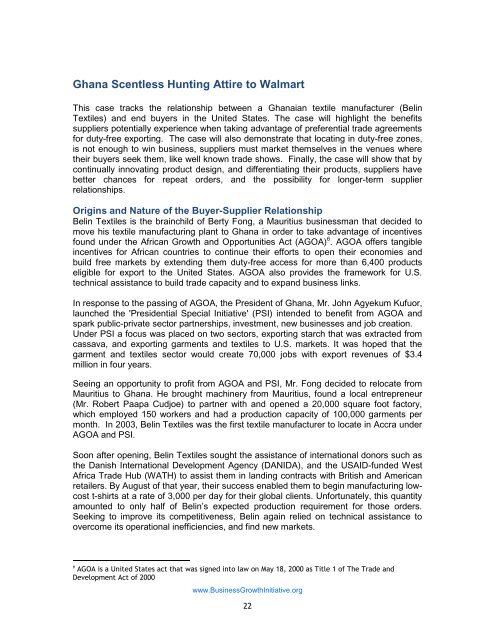the ties that bind - Economic Growth - usaid
the ties that bind - Economic Growth - usaid
the ties that bind - Economic Growth - usaid
Create successful ePaper yourself
Turn your PDF publications into a flip-book with our unique Google optimized e-Paper software.
Ghana Scentless Hunting Attire to Walmart<br />
This case tracks <strong>the</strong> relationship between a Ghanaian textile manufacturer (Belin<br />
Textiles) and end buyers in <strong>the</strong> United States. The case will highlight <strong>the</strong> benefits<br />
suppliers potentially experience when taking advantage of preferential trade agreements<br />
for duty-free exporting. The case will also demonstrate <strong>that</strong> locating in duty-free zones,<br />
is not enough to win business, suppliers must market <strong>the</strong>mselves in <strong>the</strong> venues where<br />
<strong>the</strong>ir buyers seek <strong>the</strong>m, like well known trade shows. Finally, <strong>the</strong> case will show <strong>that</strong> by<br />
continually innovating product design, and differentiating <strong>the</strong>ir products, suppliers have<br />
better chances for repeat orders, and <strong>the</strong> possibility for longer-term supplier<br />
relationships.<br />
Origins and Nature of <strong>the</strong> Buyer-Supplier Relationship<br />
Belin Textiles is <strong>the</strong> brainchild of Berty Fong, a Mauritius businessman <strong>that</strong> decided to<br />
move his textile manufacturing plant to Ghana in order to take advantage of incentives<br />
found under <strong>the</strong> African <strong>Growth</strong> and Opportuni<strong>ties</strong> Act (AGOA) 6 . AGOA offers tangible<br />
incentives for African countries to continue <strong>the</strong>ir efforts to open <strong>the</strong>ir economies and<br />
build free markets by extending <strong>the</strong>m duty-free access for more than 6,400 products<br />
eligible for export to <strong>the</strong> United States. AGOA also provides <strong>the</strong> framework for U.S.<br />
technical assistance to build trade capacity and to expand business links.<br />
In response to <strong>the</strong> passing of AGOA, <strong>the</strong> President of Ghana, Mr. John Agyekum Kufuor,<br />
launched <strong>the</strong> 'Presidential Special Initiative' (PSI) intended to benefit from AGOA and<br />
spark public-private sector partnerships, investment, new businesses and job creation.<br />
Under PSI a focus was placed on two sectors, exporting starch <strong>that</strong> was extracted from<br />
cassava, and exporting garments and textiles to U.S. markets. It was hoped <strong>that</strong> <strong>the</strong><br />
garment and textiles sector would create 70,000 jobs with export revenues of $3.4<br />
million in four years.<br />
Seeing an opportunity to profit from AGOA and PSI, Mr. Fong decided to relocate from<br />
Mauritius to Ghana. He brought machinery from Mauritius, found a local entrepreneur<br />
(Mr. Robert Paapa Cudjoe) to partner with and opened a 20,000 square foot factory,<br />
which employed 150 workers and had a production capacity of 100,000 garments per<br />
month. In 2003, Belin Textiles was <strong>the</strong> first textile manufacturer to locate in Accra under<br />
AGOA and PSI.<br />
Soon after opening, Belin Textiles sought <strong>the</strong> assistance of international donors such as<br />
<strong>the</strong> Danish International Development Agency (DANIDA), and <strong>the</strong> USAID-funded West<br />
Africa Trade Hub (WATH) to assist <strong>the</strong>m in landing contracts with British and American<br />
retailers. By August of <strong>that</strong> year, <strong>the</strong>ir success enabled <strong>the</strong>m to begin manufacturing lowcost<br />
t-shirts at a rate of 3,000 per day for <strong>the</strong>ir global clients. Unfortunately, this quantity<br />
amounted to only half of Belin‟s expected production requirement for those orders.<br />
Seeking to improve its competitiveness, Belin again relied on technical assistance to<br />
overcome its operational inefficiencies, and find new markets.<br />
6 AGOA is a United States act <strong>that</strong> was signed into law on May 18, 2000 as Title 1 of The Trade and<br />
Development Act of 2000<br />
www.Business<strong>Growth</strong>Initiative.org<br />
22

















